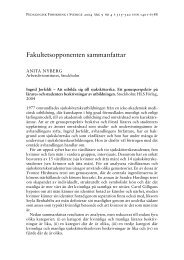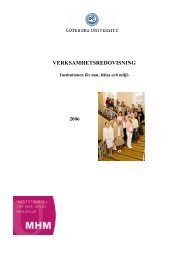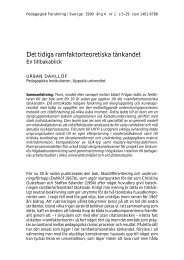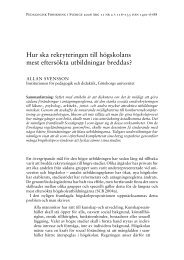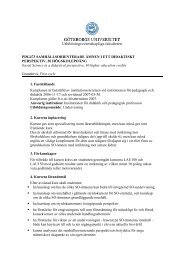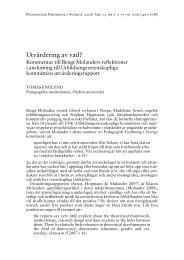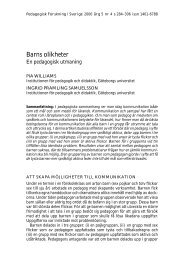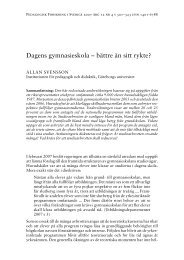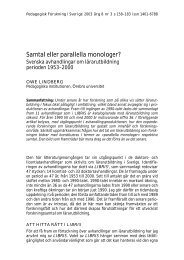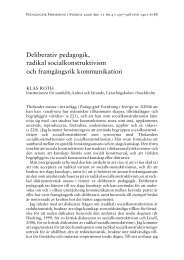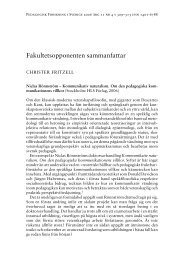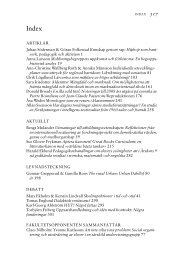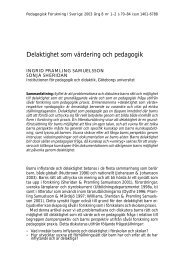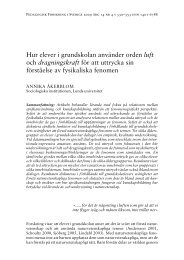University of Oslo Workshops June 29-30 Conference July 1-3 ...
University of Oslo Workshops June 29-30 Conference July 1-3 ...
University of Oslo Workshops June 29-30 Conference July 1-3 ...
Create successful ePaper yourself
Turn your PDF publications into a flip-book with our unique Google optimized e-Paper software.
Track C SITES - Session 2<br />
Comparative ICT use in Schools<br />
1 <strong>July</strong><br />
13:<strong>30</strong>-15:<strong>30</strong><br />
Room: AK 2138<br />
Chair: Carolyn Barber<br />
Discussant: Tjeerd Plomp<br />
Levels <strong>of</strong> Influence on the Use <strong>of</strong> ICT in Teaching in Australia<br />
John Ainley, Australian Council for Educational Research, Australia<br />
Information and communication technologies (ICT) have changed the environment in<br />
which students learn. This paper investigates the use <strong>of</strong> ICT in the teaching <strong>of</strong> Grade 8<br />
mathematics and science and interprets differences in ICT use between Australia and other<br />
countries, as well as variations among jurisdictions in Australia, in relation to ICT policy<br />
initiatives at national and state level. It is based on analyses <strong>of</strong> the SITES 2006 data that<br />
investigate the influence on the use <strong>of</strong> ICT in teaching <strong>of</strong> system level factors including<br />
policies supporting the pedagogical use <strong>of</strong> ICT in, school level factors such as the ICT<br />
infrastructure and teacher level factors such as teacher confidence in using ICT and<br />
participation in ICT-oriented pr<strong>of</strong>essional development.<br />
Keywords: ICT; computers; teaching; mathematics; science<br />
The Challenges <strong>of</strong> Implementing ICT in Poorly Resourced Schools in<br />
Developing Environments<br />
Sarah Howie, <strong>University</strong> <strong>of</strong> Pretoria, South Africa<br />
Kim Draper, <strong>University</strong> <strong>of</strong> Pretoria, South Africa<br />
<br />
SITES 2006 was an international comparative survey on IT in education aimed at<br />
examining the extent <strong>of</strong> ICT integration in schools and classrooms, and identifying factors<br />
contributing to effective integration <strong>of</strong> ICT into learning and teaching (Law, Pelgrum &<br />
Plomp, 2008). The study administered questionnaires for school principals, ICTcoordinators<br />
and math and science teachers. SITES 2006 also administered a national<br />
context questionnaire including four clusters <strong>of</strong> system level questions, viz demographics,<br />
education system, pedagogical trends, ICT-related policies. The rationale for this<br />
questionnaire was that it is reasonable to expect that what happens in schools and<br />
classrooms reflects system-level policies. Data from this questionnaire assist in interpreting<br />
patterns at school and classroom level. This paper is one <strong>of</strong> a set <strong>of</strong> three case studies <strong>of</strong><br />
countries that participated in SITES2006 (viz. Chile, South Africa and Australia) all<br />
addressing the general question: to what extent are national ICT- related policies<br />
implemented at the school and classroom levels and what factors enable this<br />
implementation? This paper analyses South Africa’s policy <strong>of</strong> implementing ICT widely in<br />
63



